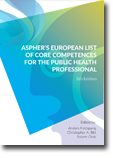
Frequently Asked Questions (F.A.Qs) and Extra Tips -
This section is dynamic and programmes are recommended to revisit the page from time to time.
We have a different set of target groups for our MPH awards and specialisations. How do we explain this?
Any information which is individual to the programme should be placed in the section 2: Programme Overview. This section is there to inform the reviewers of the distinctive elements of the programme.
We don't use ECTS. What should we put down?
If a programme doesn't use ECTS please inform the reviewers how the credits are calculated in section 2: Programme Overview and simply use the programmes credits in Section 5 points 11 to 14 instead of the ECTS calculations.
What does it mean "in service" for faculty?
This term is used to describe the professional attributes of the teaching staff outside of academia. This is sometimes called "practice." For example if a teaching staff has 20 years experience of management in the local health service.
We don't use competency lists what can we put down for learning competences in section 6?
This element of the section inquires as to the intellectual and practical skills which are expected to be transferred during the module. If you do not use competency lists you should state what the student is expected to know at the end of the module. Please refer to how competences are explained in the Glossary of Terms to help guide you.If needed please refer to the European Core Competences booklet to familiarise yourself both with the competency titles but also the content descriptors if you are more happy to enter syllabus content.
Who should complete the document?
This will depend on your programme and who is in charge of coordination. If the programme is heavily coordinated then the programme coordinators will be able to complete the most work but there should always be a consultative element with the faculty to ensure correctness and also to act as an aid in further coordination. If the programme is less well coordinated then the Curriculum Validation offers an useful quality improvement framework to help. The module level details (section 6) should be copied as single sheets and distributed to the faculty in charge of the individual modules (Extra Tips are available below for guidance). When these are clearly and coherently completed they should be sent back to the person in charge of the programme who can then submit. It would be advisable to the programme to use this opportunity to coordinate the programme by scrutinising the programme for any elements, such as, overlap, duplication or ommissions and to follow this up if necessary with a faculty meeting.

EXTRA TIPS:
1. Pedagogic/teaching methodology. Please try to avoid using simple one word answers such as "presentations," "lectures" as this will not allow the reviewers to understand fully how the methods are being used. You should give a small elaboration on the different types to give the reviewers an insight, for example: " Case studies based on the literature and the work of faculty members will be used to illustrate the real-world application of these tools and methods to address public health problems," or "The modules are a combination of lectures, seminars, in class applications and group work. Group work is organised and conducted by groups of 4 to 6 students."
This is especially important for on-line or blended learning where the teaching methods may be very distinct.
2. Assessments used. Again, in this element try to elaborate on the assessments and not use simple one word answers such as "exams" or "presentation". The guiding principle is to demonstrate to the reviewer how they assess the intended learning competences/outcomes/ objectives.
For example, "The examination will be split into two main parts. The first part will consist of a series of short questions, testing candidates’ knowledge and understanding across a range of concepts and issues that have been covered in the module. The second part of the examination will ask candidates to choose a non-communicable disease / health topic of their choice, and to write correspondence to an influential policy maker or politician to advocate for specific actions to tackle that issue.
Please ensure that if several assessments are used there is a percentage given for the weighting. For example, A two-hour timed assignment where students are required to provide a critical comparison of the qualitative research methodology and methods used in two research papers (80%) and a group presentation of the main findings of a specified literature survey (20%).
3. Specialisations and Pathways
If a programme incorporates specialisations, for example an MPH award which has specialisations in Health Systems, Epidemiology etc then the programme should provide the reviewers with a text based or graphical illustration of how the students will be expected to follow the pathways through the use of core or electives modules or courses. An example of pathways from a Validated programme can be found referenced above on this page. |
![]()




